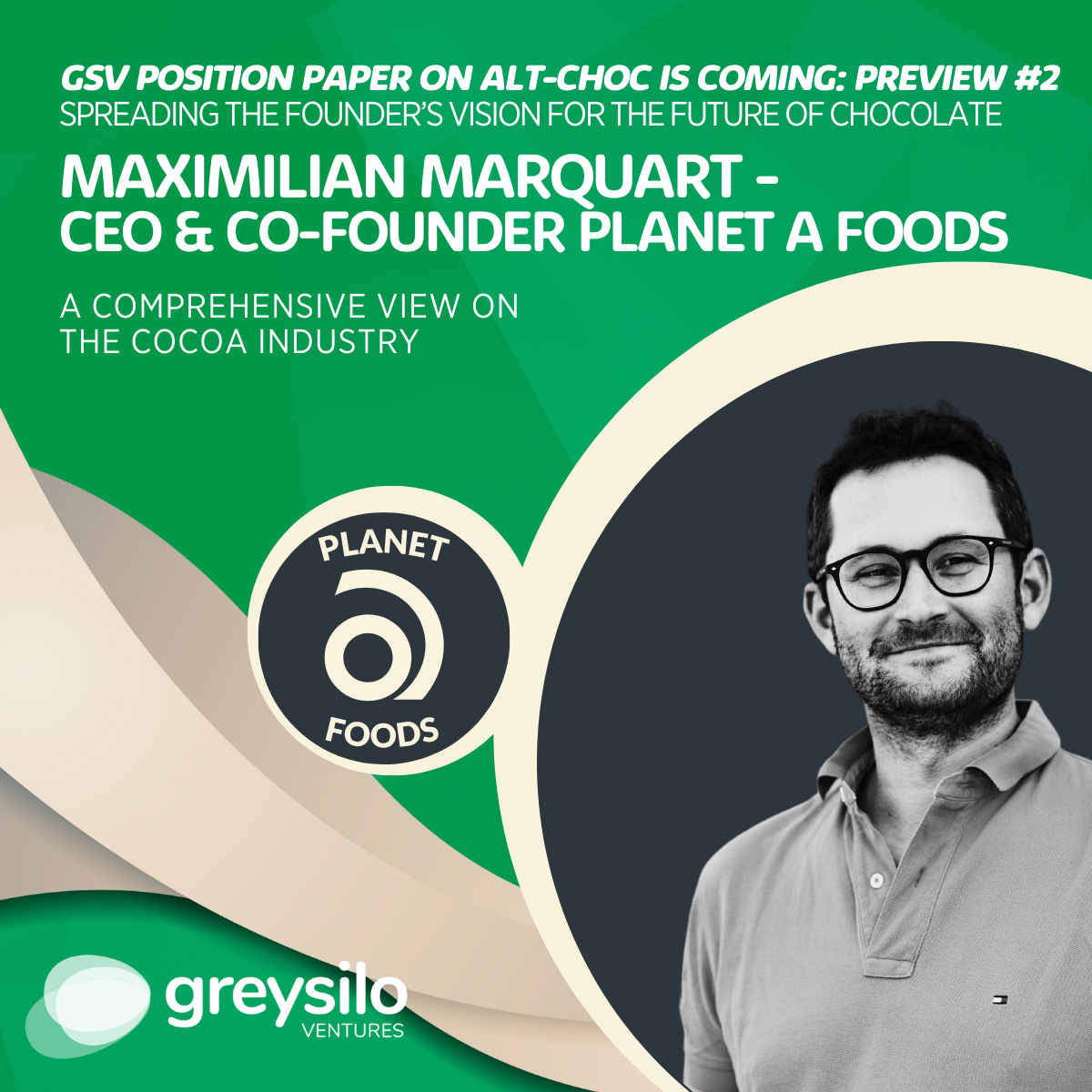
Who will be the next Willy Wonka in the alt-chocolate sector? Interview with PLANET A FOODS
The third position paper from Grey Silo Ventures is set to be released soon, and this edition will focus on a universally loved treat: chocolate!
While we eagerly anticipate discovering the new Willy Wonkas of the industry, we engaged with several founders to explore why so many innovative startups are spearheading the introduction of alternative solutions to traditional cocoa.
Freshly funded with the largest European Venture Capital round (of 15+ mln euros) for an alternative chocolate company, Planet A Foods, makers of alt-choc brand ChoViva, is one of the most known and advanced companies in the space, having secured production contracts from industry giants such as Peter Koelln and the Rewe Group.
Founded by chocolate-siblings Max and Sara Marquart in 2021 near Munich, the company rolled out different products in the market, from ChoViva-coated cookies to chunks and fillings and is now looking to expand even more their production after setting up their proprietary plant in Pilsen (CZ).
We visited the company back in November 2022, and were surprised by the speed they were moving and reacting to market needs in order to keep up with demand. We interviewed Max 2 years later, and he gave us a comprehensive view of how he sees the evolutions of the cocoa industry.
Q: “Max, can you please help the public understand why it is critical to start thinking about alternatives to chocolate that are made without cocoa?
“First and foremost we face a supply chain risk: There is not enough cocoa in the market for all the growing demand. Chocolate demand grows at over 6% YoY, while the whole supply is decreasing constantly. There’s a huge dependence on only two supply regions – Ghana and Ivory Coast. Climate change will hit both most likely. Secondly, more and more pests and diseases are affecting the cocoa trees in those regions. Lastly, farming practices are often inefficient, and farmers are stuck to using old methods. The trees are at the limit of their productivity and need to be renewed soon. After renewal they need another 5 years until they reach their peak productivity”.
Q: “What are the main challenges that you see for the newcomers in the field?”
“Regulation: There are certainly challenges related to EU legislation that are not easy to solve regarding regulatory – EUDR and ESG related”.
Q: “What is the product portfolio that you are building at Planet A Foods? Are you planning to produce consumer products (e.g chocolate bars, pralines, etc) or is your product more of a semi-finished product, therefore suited for food manufacturing companies only?”
“We are a B2B company. Currently we are not pursuing our own consumer products. However, we pursue our ingredient brand ChoViva, that is visible to the end consumers with our ChoViva seal on each package in the supermarket ChoViva as an ingredient brand conveys a delicious chocolatey taste and a sustainable alternative to chocolate, with an up to 90% reduced CO2 footprint”.
Q: “How is Planet A Foods producing its key ingredient ChoViva?”
“We re-engineered the process that generates the flavors of chocolate – fermentation and roasting – after realizing that 80% of the flavors in a milk chocolate are actually process derived flavors. Instead of cocoa we use abundant ingredients such as oats and sunflower seeds to make our ChoViva powder. They are available in vast amounts, really cost-efficient and don’t fluctuate as much as cocoa. For our ChoViva butter we are using a precision fermentation process that we are developing in house”.
“What are the key advantages of ChoViva compared to conventional chocolate?
“We have an in-house production in Pilsen – our own plant with all state-of-the-art certifications. We achieve the same delicious taste as chocolate, but with a production process that uses up to 90% less CO2, up to 94% less water and is cheaper than conventional chocolate. The story resonates well with younger customers; thus we can also generate additional revenue with line extensions”.
Q: “You have been great in securing traction with some big industry players like Rewe and Peter Koelln. What is the recipe for such early success?”
“The key was to understand the industry and play with them instead of against them. We are not here to blame chocolate – we do not want to start a fight against chocolate or cocoa. Quite the opposite, we love chocolate and hope it’ll still be available in many years from now. Yet, due to the reasons I mentioned earlier we need an alternative to chocolate that is more sustainable and that ensures the availability of chocolatey products in the long-term”.
Q: “What is your personal outlook on the future of the industry?”
“The story of ChoViva can somewhat be related to the story of sugar from sugar beets. In 1747, three decades before the American colonies declared their independence, German chemist Andreas Marggraf discovered that sugar beet roots contained sucrose, the same sugar as that of sugar cane. Marggraf’s apprentice, Franz Karl Achard, began selectively breeding sugar beets in 1784. Before the 17th century, sugar was the crop of the rich aristocrats as it was only won from sugar canes and brought over with ships. Before this invention, no one thought that sugar can be generated from sugar beet but only from sugar cane. With ChoViva we can do the same in a fastly changing environment – we can provide an indulgent, sustainable & cost-efficient new product. I think in the future, developments like ours will become the new normal next to conventional chocolate & cell-cultured chocolate. All three technologies will co-exist”.
Stay tuned for the imminent publication of Grey Silo Ventures next position paper: SWEET INNOVATORS PAVING THE WAY FOR THE WILLY WONKAS OF THE FUTURE!

